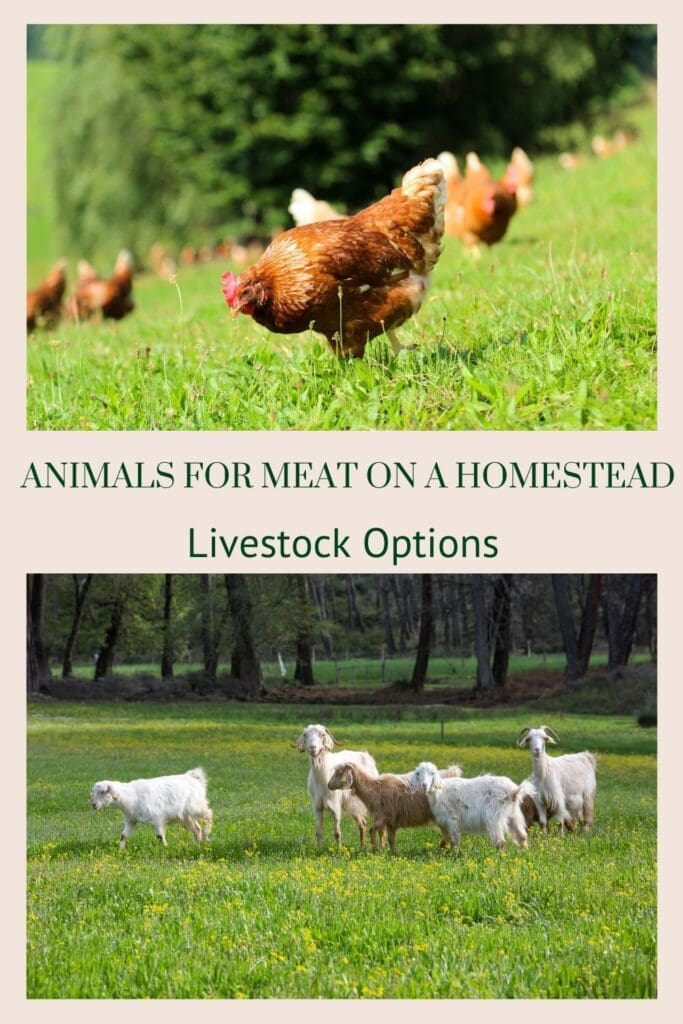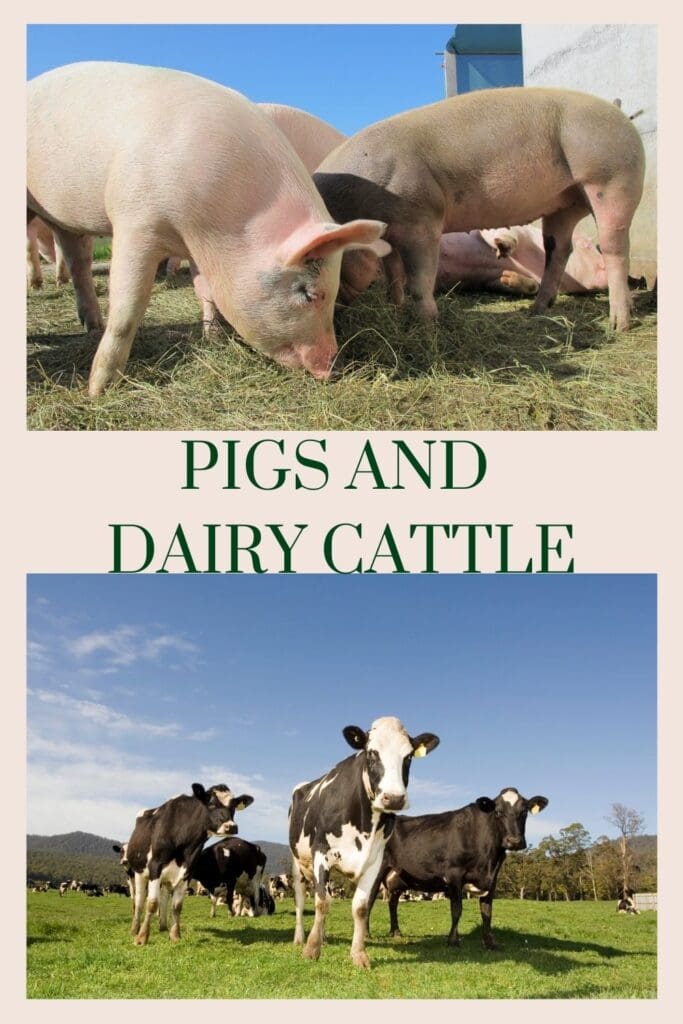Raising animals for meat on a homestead can be a fulfilling and sustainable way to produce your own food. Whether you’re interested in filling your freezer with fresh meat or providing your family with high-quality, locally sourced animal products, there are many livestock options to consider.
From backyard chickens to larger animals like dairy cows and goats, each type of livestock brings unique benefits and challenges to a small farm or hobby homestead.
For beginner homesteaders, it’s important to consider not only how much meat your family consumes but also how much space, time, and infrastructure you have.
Whether you’re interested in small animals like meat rabbits or larger breeds of goats, each requires careful planning, and that means looking beyond the cute faces of farm animals.
This post will guide you through what to consider when choosing homestead animals for meat production, including housing, fencing, and pasture needs, as well as tips on finding the best livestock for your small homestead.

Learn from Our Personal Experience
Our generational farm has experience in raising chickens, beef cattle, dairy cows, daisy goats, pigs, and rabbits. Of course, just because we have a miniature horse and a miniature donkey. Each animal has different needs for housing, water, feed, and level of care.
Here are more details on things to consider before you get animals for your homestead.
Table of contents
What Is a Homestead?
A homestead is more than just a small farm; it’s a way of life centered around self-sufficiency and producing your own food. Unlike larger farms, which may focus on large-scale meat production or dairy products, homesteads are often smaller and more personal.
Homesteaders typically raise a variety of livestock, such as backyard chickens for egg production, goats for goat milk, or even meat birds like Cornish Cross chickens for their chicken meat.
Many homesteaders also engage in gardening, using garden waste to feed livestock or to create compost.
While a homestead may produce a significant amount of meat, dairy, and fiber, it differs from a commercial farm in scale and purpose.
It’s about providing for your family’s needs rather than turning a profit. Small farmers often choose animals that require less space, such as meat rabbits, Muscovy ducks, or feeder pigs, which are all great options for producing food on a small acreage.
What to Consider Before You Bring Animals Home
Before adding animals to your homestead, there are some important things to consider. First, check your local laws to make sure livestock is allowed where you live. Some urban environments or smaller homesteads may have restrictions on the number or type of animals you can raise.
Next, make sure you have enough land to house and feed your animals. Certain animals, like larger breeds of goats or feeder lambs, need ample pasture and housing.
Another factor is time. Raising animals can be a lot of work, from feeding and watering to maintaining housing and fencing.
You’ll also need to factor in feed costs, especially for meat animals, as they can eat a lot of food before they’re ready for slaughter.
Before bringing animals to your homestead, it’s essential to consider the availability of veterinary care in your area.
Think about whether you have the time and energy to care for these animals year-round, including the winter months when heat lamps and extra shelter may be necessary.
Lastly, consider whether the animals you choose are suitable for your climate and lifestyle. Some animals, like dairy cows or meat goats, are hardier in cooler climates, while others may not tolerate the heat well.
Keep in mind that certain animals, like fiber animals or exotic animals, may require specialized care or be more suited for small farms rather than beginner homesteaders.
Let’s Talk About Animal Considerations More in Depth
While animals can be adorable, they come with significant responsibility, hard work, and expense. Consider whether you want animals purely for companionship or aesthetics, or if you want them to contribute to your homestead’s productivity.
If you’re looking for productive animals, ask yourself if you’re comfortable raising them, caring for their daily needs, and eventually butchering them for food. Are you prepared for the workload involved, or is this your first time managing livestock?
These are important questions to consider when selecting the types and breeds of animals for your homestead, as well as planning for their shelter, feeding, and overall care.
Are Animals Allowed in Your Area?
If you live in a city or suburb, there may be restrictions on which animals you can keep on your property. Many localities, especially those with homeowners’ associations (HOAs), have regulations against owning farm animals like chickens or goats.
Before bringing any animals home, it’s crucial to check your local laws to ensure you’re in compliance. If farm animals aren’t permitted, you might still be able to keep smaller options like bees or rabbits.
When I was younger, we lived in a larger city. We had most of our lawn in garden and we raised rabbits. However, when we had more than 30, the neighbors started to complain. Especially when the rabbits chewed through the chicken wire fencing and were roaming the neighborhood eating things in their gardens.
There were a few days we got out of school to go and catch the rabbits. We had a Brittany Spaniel pointer for a dog, and she was great with helping my brother and I catch them.
Are These Animals for Meat?
For some, the idea of butchering animals for food may feel overwhelming. However, your homestead doesn’t have to raise animals for meat if that’s not your goal. You can focus on animals that produce other valuable resources, such as eggs, milk, or fiber.
That said, a fully functional homestead often includes animals raised for meat. If you don’t have butchering skills, they can be learned. Whether you’re raising cattle, chickens, rabbits, or pigs for meat.
If the thought of harvesting your own animals feels too difficult, it’s important to be aware that some animals may live well past their productive years. For instance, hens typically stop laying eggs after around five years. While it’s perfectly fine to keep them as pets, understanding this before choosing your animals is key to managing your homestead effectively.
Do You Travel? What level of care does the animal require?
While homestead animals can be more independent than pets like dogs, frequent travel requires careful planning.
You’ll need to arrange for a farm sitter to ensure your animals are safe, fed, and protected from predators, even if you have automated feeding and watering systems in place.
When we were younger, we used to help other farmers out by going to do their farm chores while they were gone. It took a lot of planning and practice. Even though we milked out own cows and had our own animals, we did things differently. We would have to do chores on our friend’s farm for both the morning and afternoon.
Here are a few of the things to go over with someone caring for your animals.
- How much to feed the animals.
- How to operate their equipment.
- Sanitization of the equipment.
- Who to call if there were veterinary needs.
- Treatment if there were any sick animals.
- Making sure the animals were secure for the evening.
- Contact information for the owner, just in case we need to call in an emergency.
For short trips, animals like chickens and rabbits can manage for a few days with automatic feeders and waterers. Honeybees are largely self-sufficient, especially in the summer when they require minimal attention.
However, larger livestock such as cattle may need more oversight. In winter, cattle require extra care, and if you have dairy cows, they present a unique challenge since they must be milked twice daily during their season. If you plan to travel, you’ll need a knowledgeable sitter who can properly care for and milk your dairy cows while you’re away.

Livestock Medical Needs and Veterinary Care
Not all regions have veterinarians who specialize in livestock, and larger or more exotic animals may require specialized care.
Routine medical needs, such as vaccinations, deworming, and emergency treatments, can arise, so it’s important to have a vet nearby who is experienced with your type of animals.
Additionally, some animals, like dairy cows, goats, or horses, may require more frequent care, including hoof trimming or treatment for common ailments like mastitis or bloat.
Knowing what kind of medical needs your animals may have, and ensuring you have access to veterinary services, will help you maintain the health and well-being of your livestock.
Do You Have Enough Space?
Different animals have varying space requirements, not just for shelter but also for room to roam and graze. It’s important to provide enough space for your animals to thrive and grow properly.
If you’re working with a small plot of land, like an acre, manageable animals such as chickens, rabbits, or honey bees are great choices that can still contribute to your homestead’s production. For those with more land, larger animals like goats, pigs, or even cattle may be an option, depending on local ordinances and zoning laws.
Housing, Fencing, and Pasture
The type of animals you choose will dictate the housing and fencing needs for your homestead.
Larger animals, like dairy cows and feeder lambs, require more space and sturdy, well-constructed housing to protect them from wild animals, as well as from the cold during the winter months. On the other hand, smaller animals like chickens, guinea pigs, or honey bees need less space and can often be housed in smaller structures.
Fencing is another important aspect of keeping livestock. For larger animals, an electric fence may be a good option, while smaller animals like goats or meat birds may only require simple enclosures.
For free-range animals, good fencing is essential to prevent them from wandering off and to protect them from predators.
Water Sources for Your Livestock
Make sure you also have water sources and shelter that meet the specific needs of the animals you plan to raise.
Providing water for animals is a crucial task on any homestead or farm. Large livestock, like cows and horses, can consume several gallons of water each day, making a reliable water source essential. If your property has access to a natural water source, such as a stream or pond, this can be a great solution for keeping animals hydrated.
Winter brings extra challenges when it comes to watering. Frozen tanks, buckets, and troughs can make it difficult to provide fresh water. Using electric-heated water bowls and buckets can prevent freezing during the day, while a floating heater or deicer works well in larger troughs to keep water available.
If you rely on a well, power outages from storms can cut off access to water. To avoid this, it’s important to plan ahead by storing enough water before a storm to ensure all your animals stay hydrated during an emergency.
Manure Management
Manure is a valuable resource on any homestead. With multiple animals, you’ll generate a significant amount of manure, which can be an excellent fertilizer for your garden. It’s also useful for improving the structure of clay or sandy soil.
The management of manure depends on the type of animal. For instance, rabbit manure can be directly applied to your garden as it won’t harm plants, while chicken manure needs to be composted first to prevent plant burn.
Similarly, horse and cow manure should be aged or composted thoroughly before use to ensure it’s safe for your plants. For larger animals like a horse and cow, you should plan on 1 acre per animal to have enough land to apply the manure on.
Before bringing animals onto your homestead, take the time to research and create a solid plan for handling manure effectively.

Choosing the Right Livestock
Choosing the best livestock for your homestead depends on several factors, including space, climate, and how much meat your family consumes.
For those with limited space, small livestock like meat rabbits or a small flock of backyard chickens can be a great way to produce your own meat without requiring much infrastructure. Chickens not only provide meat but also fresh eggs, making them a dual-purpose animal.
If you have more space, you might consider larger animals like feeder pigs, dairy goats, or even meat goats, which are all good options for red meat production.
Goat meat is lean and nutritious, and certain breeds of goats can also provide goat milk, making them a great addition to small farms. Another excellent option is raising Cornish Cross meat chickens, which grow quickly and provide chicken breasts and whole animal meat for your table.
Choosing the Right Livestock for Your Homestead
Chickens
Chickens are often the first animals that come to mind for homesteading, and for good reason. They provide meat, eggs, and manure, making them a versatile and valuable addition to any homestead. Chickens require a coop or secure area to protect them from predators and a designated space to lay eggs.
Ducks
Ducks are another excellent option for homesteaders. Depending on the breed, ducks are easy to raise and provide both meat and eggs. They require minimal space and are generally compatible with other animals. However, ducks are slow-moving and vulnerable to predators, so secure fencing and proper precautions are essential to keep them safe.
Quail
Quail are small, cute birds that are well-suited to small homesteads. They provide meat and eggs while taking up little space. However, quail don’t produce as much meat or eggs as chickens, and they can be more temperamental when it comes to laying. Because they can fly, they’re not suitable for free-range setups and will need enclosed housing.
Pheasant
Pheasants are larger birds that provide high-quality meat and eggs, though they don’t produce in large quantities. They are more flighty and less tame than chickens, making them more challenging to manage. Pheasants can add variety to your homestead, but they shouldn’t be relied on as your main source of meat or eggs.
Rabbits
Rabbits are commonly raised on homesteads for meat. New Zealand Whites and Californian breeds are ideal for meat production due to their higher yields. Rabbits don’t require much space, needing only a simple hutch, but they do need daily attention, including feeding, watering, and cleaning.
Honey Bees
Beekeeping can be one of the more complex homestead ventures, but it comes with great rewards. Though the startup costs for beekeeping can be high, as there is specialized equipment to purchase. The long-term benefits are worth it, including honey production and garden pollination. Once established, bees are relatively low-maintenance in the summer but may need supplemental feeding during winter.
Goats
Goats are versatile animals, ideal for either meat or dairy production depending on the breed. They’re more manageable than cattle and provide a great entry point for beginner homesteaders. However, goats are known for their mischievous nature and require secure fencing and shelter. Goats need to be fed and watered multiple times daily, and their escape-prone behavior means you’ll need strong, goat-proof fencing.
Pigs
Pigs are a great choice for beginner homesteaders due to their short production cycle. You can raise a piglet in the spring and butcher it by fall, avoiding the need for winter care. Pigs are easy to manage, adaptable, and not picky about food, but they do require ample space, water, and shelter.
Cows
Cows are an excellent addition for larger homesteads with adequate space, pastures, and secure fencing. They require minimal maintenance in the warmer months but need more attention during the winter, particularly in colder climates. A single cow can provide enough meat to feed your family for an entire year, making them a worthwhile investment if you have the space.
Horses
While not as common as other livestock, horses can offer significant value to a homestead. They can help plow fields, transport goods, and produce manure for compost. However, horses are costly, require a lot of care, and need more space and stronger fencing than other homestead animals. They also demand daily grooming, ample food, water, and shelter.
What About Butchering?
This is one important topic when thinking about raising your own animals for meat.
Will you be taking care of things yourself? If so, do you have a plan?
When my dad was young, he worked for a butcher and learned all there is to the process. Therefore, we were able to take care of the butchering process ourselves. We had chickens, goats, and beef when I was growing up. Plus, deer hunting happened each fall.
You need to be able to keep things humane, sanitary, and safe to eat while processing.
He would take care of the animal, carcasses and cuts of meat. We took care of preparing the meat for freezing by wrapping and labeling.
Now, I need to tell you, the smell of butchering the chickens was more than I could take growing up. When it was “the day”, I would do anything else but that. I cleaned the barn, mowed the grass with the push mower, and did all the laundry. Just so I could stay out of the kitchen and house.
What if you don’t have someone with butchering knowledge?
Then make sure that there are professionals available in your area to take care of things for you. Since I’ve been married, we use local butchers to take care of the whole process. We just need to bring a healthy animal and tell them how we want things processed.
A Few Final Thoughts
Raising your own meat on a homestead is a great way to ensure good quality, fresh food for your family. Whether you choose to raise small animals in a backyard or larger animals on a small acreage, there are many livestock options to suit your space and needs.
By carefully planning and preparing before bringing animals home, you can create a sustainable and rewarding homestead that produces everything from rabbit meat to fresh eggs to delicious chicken meat. Good luck on your homesteading journey.
References
The Homestead Survival. Offers articles and guides on various livestock.
Mother Earth News. Provides articles and resources on homesteading, including livestock care.
Backyard Chickens. A community and resource for chicken care and other small livestock.


